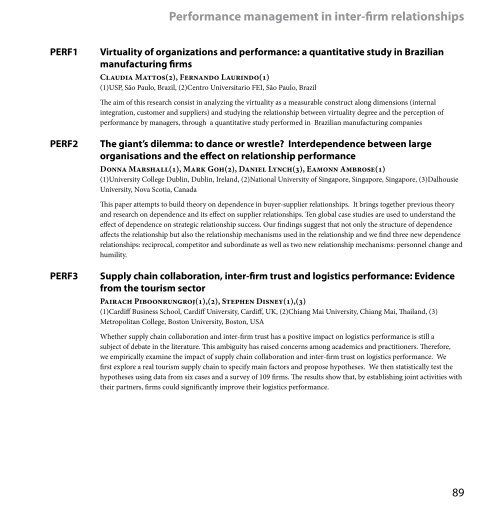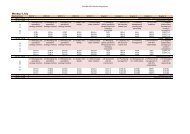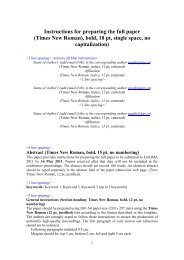Download the book of abstracts - EurOMA 2011
Download the book of abstracts - EurOMA 2011
Download the book of abstracts - EurOMA 2011
You also want an ePaper? Increase the reach of your titles
YUMPU automatically turns print PDFs into web optimized ePapers that Google loves.
Performance management in inter-firm relationships<br />
PERF1 Virtuality <strong>of</strong> organizations and performance: a quantitative study in Brazilian<br />
manufacturing firms<br />
Claudia Mattos(2), Fernando Laurindo(1)<br />
(1)USP, São Paulo, Brazil, (2)Centro Universitario FEI, São Paulo, Brazil<br />
The aim <strong>of</strong> this research consist in analyzing <strong>the</strong> virtuality as a measurable construct along dimensions (internal<br />
integration, customer and suppliers) and studying <strong>the</strong> relationship between virtuality degree and <strong>the</strong> perception <strong>of</strong><br />
performance by managers, through a quantitative study performed in Brazilian manufacturing companies<br />
PERF2 The giant’s dilemma: to dance or wrestle? Interdependence between large<br />
organisations and <strong>the</strong> effect on relationship performance<br />
Donna Marshall(1), Mark Goh(2), Daniel Lynch(3), Eamonn Ambrose(1)<br />
(1)University College Dublin, Dublin, Ireland, (2)National University <strong>of</strong> Singapore, Singapore, Singapore, (3)Dalhousie<br />
University, Nova Scotia, Canada<br />
This paper attempts to build <strong>the</strong>ory on dependence in buyer-supplier relationships. It brings toge<strong>the</strong>r previous <strong>the</strong>ory<br />
and research on dependence and its effect on supplier relationships. Ten global case studies are used to understand <strong>the</strong><br />
effect <strong>of</strong> dependence on strategic relationship success. Our findings suggest that not only <strong>the</strong> structure <strong>of</strong> dependence<br />
affects <strong>the</strong> relationship but also <strong>the</strong> relationship mechanisms used in <strong>the</strong> relationship and we find three new dependence<br />
relationships: reciprocal, competitor and subordinate as well as two new relationship mechanisms: personnel change and<br />
humility.<br />
PERF3 Supply chain collaboration, inter-firm trust and logistics performance: Evidence<br />
from <strong>the</strong> tourism sector<br />
Pairach Piboonrungroj(1),(2), Stephen Disney(1),(3)<br />
(1)Cardiff Business School, Cardiff University, Cardiff, UK, (2)Chiang Mai University, Chiang Mai, Thailand, (3)<br />
Metropolitan College, Boston University, Boston, USA<br />
Whe<strong>the</strong>r supply chain collaboration and inter-firm trust has a positive impact on logistics performance is still a<br />
subject <strong>of</strong> debate in <strong>the</strong> literature. This ambiguity has raised concerns among academics and practitioners. Therefore,<br />
we empirically examine <strong>the</strong> impact <strong>of</strong> supply chain collaboration and inter-firm trust on logistics performance. We<br />
first explore a real tourism supply chain to specify main factors and propose hypo<strong>the</strong>ses. We <strong>the</strong>n statistically test <strong>the</strong><br />
hypo<strong>the</strong>ses using data from six cases and a survey <strong>of</strong> 109 firms. The results show that, by establishing joint activities with<br />
<strong>the</strong>ir partners, firms could significantly improve <strong>the</strong>ir logistics performance.<br />
89





